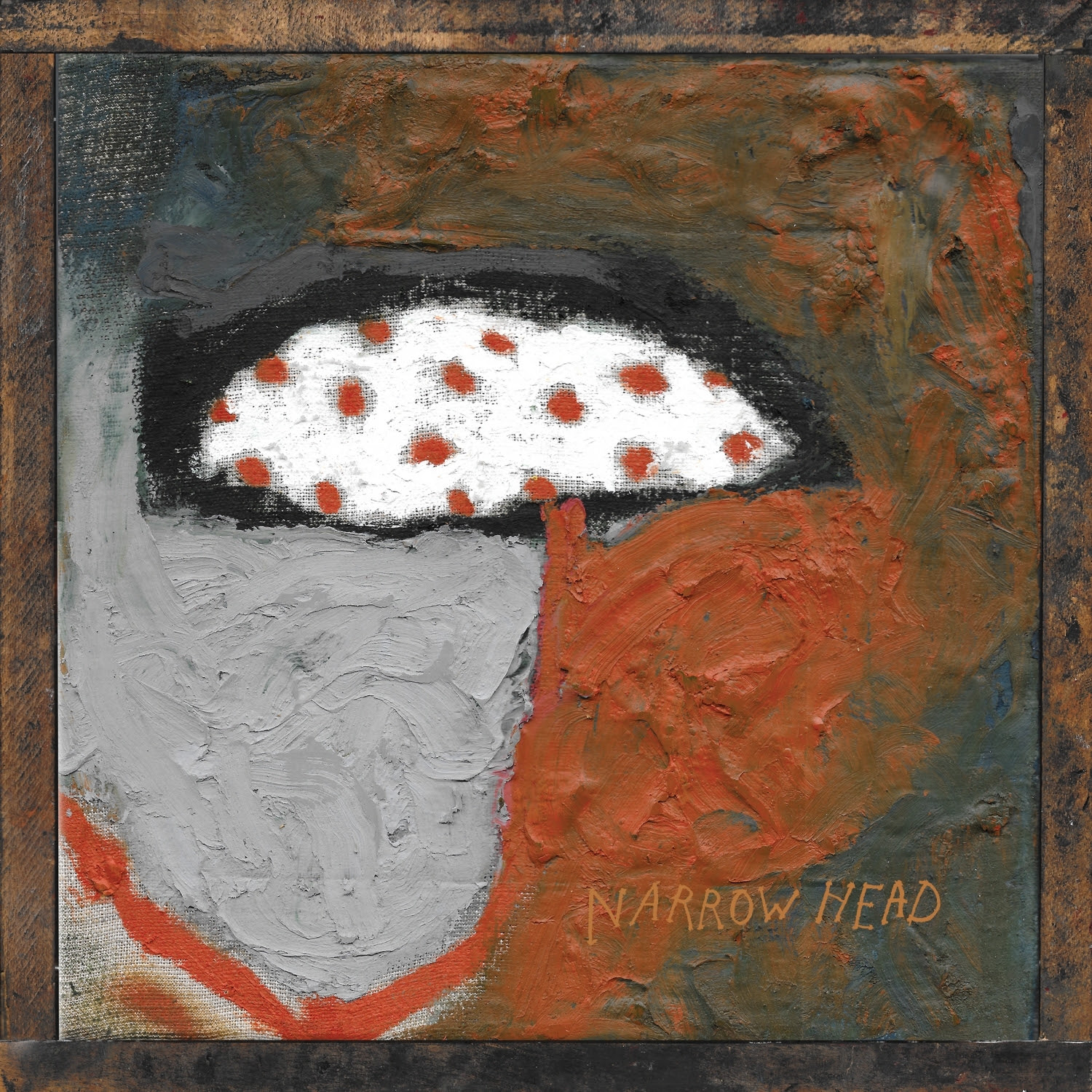The dream of the '90s is alive in Houston. Narrow Head's second album 12th House Rock, out today, swirls together a broad spectrum of heavy alt-rock sounds from the late 20th century. Opening track "Yer' Song" begins with gnarled Alice In Chains melodies, moves on to a dreamily whimpered Deftones chorus, then rips into a guitar solo straight out of Siamese Dream. From there the album contains traces of everything from "Evenflow" to "Champagne Supernova" to various squealing Loveless tracks, Narrow Head working their way across old Lollapalooza posters and KROQ playlists while still cohering into a recognizable signature sound.
Thanks to singer-guitarist Jacob Duarte's nasal wails, Narrow Head's songs are often richly melodic, but the way they prioritize their scraping rhythm section gives their music a raw, combustible quality that calls back to a time before the '90s underground was fully subsumed into the mainstream. It's a reminder that rock music can be catchy without really scanning as pop, and that it can be scuzzy while remaining not just accessible but deeply magnetic. In the parlance of their favored era, this shit is rad.
To celebrate 12th House Rock's release today, the band is walking us through the album track by track, sharing the story behind each one. The original lineup of Duarte, guitarist William Menjivar, and drummer Carson Wilcox chipped in thoughts, as did Ryan Chavez, who joined Narrow Head after first working as their producer, guitarist Kora Puckett (Bugg, ex-Sheer Mag), who also recently joined the band, and Erica Miller of Big Bite and Casual Hex, who contributed lyrics and vocals to the album. Press play below and read along as you go.
1. "Yer' Song"
https://youtube.com/watch?v=1Ug33u7UoTQ
JACOB DUARTE: This is the opener. I wanted this to be the introduction to Narrow Head to new fans and people who have been with us since day one. I wanted it to be a rock anthem. The chord progression we use for the verses were my take on 70’s rock. [Laughs] James Gang, Boston, whoever the fuck... just rock 'n' roll. I liked the idea of having a long ripper to open the album.
RYAN CHAVEZ: This song was always intended to open the album when we began envisioning a flow and tracklist to 12th House Rock. The idea was initially discouraged by our confidants who, understandably, believed a concise ripper would best open the album to people hearing us for the first time. At over 5:30, it's definitely asking the listener for some patience, but only in hopes that it prepares them to absorb the rest of the album as a whole and not just a collection of singles. Gratefully, we have record labels and a manager who are willing to get our ideas out the way we imagine them. We think of this song as the most representative for this era of Narrow Head -- our anthem.
CARSON WILCOX: This was one of the first songs we began writing after [early EPs] Fantastic Wow and Spring Singles. At that time it was just Jacob, Will, and I, so I remember it being a sort of labor to write and flesh out with such limited instrumentation at our disposal at any given time. I think Jacob had the name "Yer' Song" for a while (as a nod to James Gang) but we actually called it "E2K" for a long time because it loosely reminded us of a song from that era of Hum.
2. "Ponderosa Sun Club"
https://youtube.com/watch?v=WR1Iwhdphus
WILLIAM MENJIVAR: Jacob had the song idea for a while. I really enjoyed the chord progression Jacob wrote because it used these bright/open-string chords we didn’t usually use. I grew to love the song before there were any words, and I’m really glad Jacob trusted me to write the lyrics to this song. The song is about indecision during big life moments, but I didn’t want the words to feel pessimistic. My goal was to create a sense of optimism and reminiscence through the words because that’s what I felt when I heard the song. The song feels more relevant now than when it was first written with everything going on right now. It’s like my words have come back to haunt me.
WILCOX: This is one of my personal favorite songs Jacob has ever written. I tracked all the drums for the record -- no click, scratch guitar, or anything -- and we did 14 songs in two days. After sitting with the takes for a while, this song just wasn’t up to snuff for me, so -- bless Ryan for his patience -- we went back in to track drums one more time just for this song, and ultimately it worked out for the best. I’m really proud of how simple but propulsive the groove is on this song.
DUARTE: I think I wrote this on my acoustic during Hurricane Harvey in 2017. I had the melody for a while, but I just couldn't get myself to write lyrics that I liked. Thankfully Will came through. This is one of those songs where I tune the B string down to match the A string. I don't know why I started doing it, I just liked how it sounds when all the strings are strummed together.
3. "Stuttering Stanley"
https://youtube.com/watch?v=1RFS_gHPWJo
WILCOX: During the period immediately following [2016 debut album] Satisfaction, our dear friend Ryan Seelig played bass/guitar for a time, and while his stay was somewhat brief, I’ve always said that he represented a turning point in our sound that was critical in getting us to where we are now. We were obviously already big fans of MBV/Swervedriver and some of the more obvious Creation Records reference points, but Ryan helped us tap into some of that more straight up Britpop influence that I think shines through especially on this track.
CHAVEZ: This is maybe my favorite song on the album. The writing and arrangement of "Stuttering Stanley" is really clever to me in that it's a pop song with verses and choruses in a major key, but naturally slips into a minor key for the bridge. I love artists like the Carpenters and Big Star, who incorporate melancholic undertones to blatant pop songwriting. The bridge to this song is also one of my favorite parts of the album, as I am giving some Alice In Chains realness in the bass sound and performance.
4. "12th House"
https://youtube.com/watch?v=C5Rclf8CLn0
CHAVEZ: In producing this track, I employed an element from a Rival Schools song called "Holding Sand." Two different takes of drumming are panned hard left and right, performing drum patterns with a slight variation on the groove. Carson plays one straight, and the other intentionally disjointed. In rough mixing, it built up and abruptly fell apart in a way that reminded Carson of Yankee Hotel Foxtrot. I gravitated to that sentiment and laid into it more when I went into final mixes.
5. "Hard To Swallow"
https://youtube.com/watch?v=3T9wFUGAAwA
WILCOX: This is a re-recording of a song we did in 2017 with our friend Rubio. The studio they were working in at the time was dark, claustrophobic, and honestly anxiety-inducing. The 12th House Rock sessions were almost the complete opposite from an environment perspective.
DUARTE: Carson pretty much says it best. It was the rawest recording session we’ve ever done. Smoking cigs inside, doing bad-kid stuff, and just having a good-ass time in this cave of a studio. It needed to be re-recorded and included in 12th House Rock because it's an important song that shaped how we sound today.
KORA PUCKETT: Probably my favorite song on the record. I pushed for this one to be mastered with a bit more rawness than the rest of the record. It turned out great.
6. "Crankcase"
https://youtube.com/watch?v=B5OUOaAmpIs
DUARTE: My personal favorite. This song channels all my aggression and angst. [Laughs] Actually the main riff was written by our OG guitarist Ryan Hughes. I believe it was one of the last voice memo riffs he sent me. This song rips and makes me want to stage dive.
7. "Nodding Off"
https://youtube.com/watch?v=bCWn_NlkLYE
CHAVEZ: There's a moment in recording an album where you listen and think, "This sounds like a real album." "Nodding Off" was the song which, in rough mixing, presented the sound we heard in our heads for 12th House Rock: lush, massive, delicate, abrasive, dynamic. It needed to be all of those things, and "Nodding Off" felt like we were getting somewhere with it.
8. "Night Tryst"
https://youtube.com/watch?v=CG6MaNseiYk
WILCOX: This was called "Will's Song" for a long time because it was the first time Will brought a song to the table after switching from bass to guitar in Narrow Head. It ended up being the no-doubt-in-our-minds First Single pretty quickly. The man is a hit-maker.
CHAVEZ: Previous to recording the album, and joining the band, they encouraged me to add any bass parts that I felt appropriate for the songs. When they showed me this one, I immediately thought, "Ooh, I know how this is supposed to feel." I’m absolutely channeling D’arcy Wretzky, Kim Coletta, and Jeff Dimpsey on this bass performance. Another favorite moment of this album for me is the bridge, which features the inimitable ghost notes of Carson Wilcox. We sent this record to a few different mixing engineers to mix, but none could achieve both the power and dynamics of the drums that we were looking for. To me, Carson’s snare drum ghost notes are an essential part of the feel and energy of this band. They’re like a song within the song to my ears.
MENJIVAR: I really just wanted to write a bouncy, straight-to-the-point rock song, and that's what came out. I really didn’t think Jacob and Carson would be into it when I brought the idea to the table, but they humored me and jammed the idea. Jacob structured the song right then and there, and Carson added a drum beat with so much groove. They really brought the song to life. Then Jacob threw the lead guitar in and it was game over after that. He’s the shredder of the band. The vocal melody is very Jacob. Cool to know that this was the first song written by the three of us.
9. "Emmadazey"
https://youtube.com/watch?v=XOxc99WzKvg
WILCOX: The main riff of this song came together pretty easily. Jacob showed it to me and I felt the backbeat pretty naturally. The bridge was something that we had to work on a bit more. He wanted it to be rhythmically like the verses in "Turned Out" by Helmet, where [drummer John Stanier] is moving the snare hits around on top of this weird riff in 5/4, so it feels super wonky at first. I ended up playing a more straight over-the-bar thing, but it is still notably the only riff on the whole record that's not in 4/4.
DUARTE: Another re-recorded song from the Fantastic Wow EP. We could never get this song to hit live, but now it's one of my favorites to play.
10. "Wastrel"
https://youtube.com/watch?v=a5x4rh-TbrQ
DUARTE: I wrote this song on my front porch at four AM. I don’t know what I was feeling. I was in a hole.
PUCKETT: I remember Jacob texting me a voice memo of this song back around the time he wrote it. He wasn't sure if he should use it or not at that point, and I was like, "This goes on the record!"
11. "Delano Door"
https://youtube.com/watch?v=ncZ2z89Z8s0
DUARTE: We wrote this and thought, "Fuck yeah, a seven minute song! I can't wait to punish people with this one." While recording it I knew the verses required something I just couldn't pull off. So I asked my good friend Erica Miller if she would help with the lyrics and do some vocals on this track. The first thing she sent back was incredible. She did some edits, and when she sent us her final product it fit the song so perfectly. She really makes the song.
ERICA MILLER: When Jacob asked me to be a part of this song and told me what he wanted it to be about, I immediately sat down and started writing. He wanted the song to be about the back entrance to the room he was living in at the time. I became very familiar with this room over the course of a couple years while I was touring with a band I play in called Big Bite. Somehow Jacob was either out of town or on tour with Narrow Head when we played Houston on multiple occasions, but we would stay at his house whether he was there or not.
I always managed to get Jacob’s entire room to myself. The interesting thing about this room was its location in the house and the fact that it probably was not intended to be a bedroom at all. If it was designed to be a laundry room it was definitely the biggest laundry room I’ve ever been in. An unusual thing about this room is that it contained three separate doors. One door to the outside, one door to the kitchen, and one door to another person’s bedroom. The house was basically a labyrinth of rooms. I tried to channel my own energetic experience of staying in that room and also the energy that it held in relation to Jacob. I think I started writing before I even heard the instrumental track, but I figured I would just try to write whatever came to mind when I thought about that room and Jacob. Normally when I write lyrics I write with the song and the structure in mind, but this process was much different. Jacob gave me specific timestamps for where he wanted vocals, so I spent some time trying to piece together the things I had written and how they could fit into the song.
The song was a process of honing in on a vibe for me. I probably could analyze what I wrote and interpret its specific meaning, but my intention was just for it to be a stream of consciousness. I’m sure whatever came out is a combination of my experience in the room, my relation to Jacob, and a projection of my own experiences and how I related to it all. I think Jacob might agree with me that the esoteric nature of this track mirrors the nature of our friendship. I feel grateful for getting to contribute to this record and honored that everyone in this band trusted me to hone in on the vibe. Hopefully we’ll all get to perform this track live one day.
12. "Bulma"
https://youtube.com/watch?v=AwxG_jwqnms
MENJIVAR: This song sort of marks the transition between the old era into the new. This song was written when Ryan Seelig was in the band. This song feels like a combination of three MBV songs in one. It's like every instrument is doing a completely different thing, but they all coalesce into this catchy rock song.
DUARTE: The "pop hit" I always imagined. MBV, Blur, Britpop was the goal.
13. "Evangeline Dream"
https://youtube.com/watch?v=nkdOZ2WjeJ0
WILCOX: In fitting fashion, this whopper of a track came together last as far as writing and arrangement. Jacob and I had noodled around with the first riff forever, and knew we wanted it to get to that big end riff somehow, but figuring out how to dynamically build the middle of the song to get to that point took quite some time. We always knew this would be the last song on the record.
CHAVEZ: The opening guitar part is played through a Leslie speaker on fast setting. The Leslie sat in a dusty, cobwebbed warehouse in the studio where we recorded, and I can hear the air spinning around that room when I listen back. The Leslie sound gives a, for lack of better description, "dreamy" effect that isn’t heard on the rest of the album, or any other Narrow Head recordings for that matter. The clean Leslie sound slows down when the band comes in, but it plays through the entire song until the end.
We had a rough arrangement for the song going in, but the structure of the intro didn’t flush out completely until a few months after basic tracking. It was really important to myself and Jacob that "Evangeline" was as sonically affecting as it was emotionally substantial, so we kept revisiting the arrangement until it was perfect. This also has lyrical contributions from myself and Will, as the subject of losing a loved one and only getting to see them in dreams struck me very personally.

12th House Rock is out now on Run For Cover. Buy it here.






